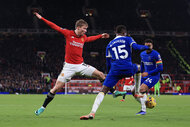How USMNT Captain Tyler Adams Is Winning Over America And The World
Whether on or off the pitch at the 2022 FIFA World Cup in Qatar, Tyler Adams has shown the world what true leadership is.

Poise. Confidence. Accountability.
While Tyler Adams exudes a vast spectrum of leadership qualities, these are just a few of his innumerable traits that made his peers’ choice of anointing him captain of the USMNT ahead of the 2022 FIFA World Cup in Qatar such a no-brainer, even on a squad that features the heroic talisman Christian Pulisic, whose nickname is “Captain America”. Sure, Adams is a supremely talented midfielder as evidenced by his current stint with the USMNT, his past play in the MLS for the New York Red Bulls and now, in his first year with the English Premier League squad Leeds United, yet it’s the intangibles where he really shines. At a mere 23 years old, the Wappingers Falls, NY native is now the youngest player since 1950 to helm a World Cup team for the United States and the third youngest in the program’s entire history.
“It’s a huge honor for me,” Adams noted in a presser ahead of the start of the tournament. “I want to represent this team in the right way, represent my family in the right way. And you’re playing for something a lot bigger than yourself. You’re playing for all the people in the U.S. that are watching and supporting you.”
RELATED: The World Cup’s Most Shocking Upsets
Weighing in on what makes Adams such a pivotal asset for his youthful American squad, U.S. coach Gregg Berhalter praised his young captain in more ways than one.
“We think he has great leadership capabilities, and he leads by his actions and words,” Berhalter revealed during the same press conference. “Tyler is a guy that’s just mature beyond his years, and you notice it from the minute you start talking to him.”
The run-up to the U.S.'s pivotal match with Iran, during which they'd either win and progress to the Round of 16 or crash out of the tournament, put that maturity on full display. The match, of course, carried a sense of gravity that extended beyond a simple sporting affair. The U.S. and Iran haven't had formal diplomatic relations in more than 40 years and have been frequent adversaries on the global stage over that time. Adding to the tension is the internal strife raging within the Islamic Republic since mid-September, when mass protests began across the country in the wake of 22-year-old Mahsa Amini's death in state custody after being detained, allegedly for wearing her traditional hijab improperly. With throngs of people braving violent retaliation to demand equal rights for women, Iran's national team pointedly refused to sing their national anthem ahead of their opening match against England in solidarity, and the USMNT Twitter account briefly posted an image of Iran's flag without the Islamic Republic emblem, further stoking animosity.
Against this backdrop stood Adams at the pre-match news conference. Peppered with questions by an Iranian reporter who clearly took umbrage at Adams mispronouncing Iran ("eye-ran" instead of "ee-ron"), Adams delivered an authentic apology and also calmly answered the same reporter’s loaded question about how he feels when it comes to playing for a country that “has so much discrimination against Black people in its own borders.”
“My apologies on the mispronunciation of your country,” Adams genuinely offered. “That being said, there’s discrimination everywhere you go. One thing that I’ve learned, especially from living abroad in the past years and having to fit in in different cultures, is that in the U.S., we’re continuing to make progress every single day.”
“I grew up in a white family with obviously an African-American heritage and background as well, so I had a little bit of different cultures, and I was very easily able to assimilate in different cultures,” continued Adams. “Not everyone has that ease and the ability to do that. And obviously it takes the longest to understand. And through education, I think it’s super important—like you just educated me now on the pronunciation of your country.”
“So, it’s a process,” Adams added. “I think as long as you see progress, that’s the most important thing.”
If anyone was wondering, that’s not the typical answer of a 23-year-old. In a situation that could’ve easily gone off the rails, Adams kept his cool, providing a highly measured and insightful response that even most revered career diplomats from Washington would have had a hard time doing.
Adams has been playing superbly throughout the group stage of the World Cup in Qatar, specifically as a defensive-minded midfielder who can track down incoming balls over the top as well as thwarting designed, speedy attacks from his opponents, but it’s how he composes himself off the field that should set the exemplary archetype for what we should all strive to be, both athletes and non-athletes alike.













